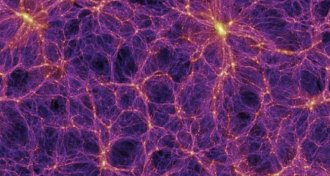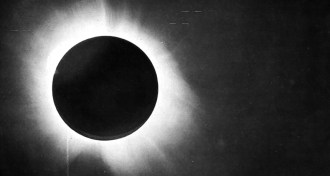
Lisa Grossman is the astronomy writer for Science News. Previously she was a news editor at New Scientist, where she ran the physical sciences section of the magazine for three years. Before that, she spent three years at New Scientist as a reporter, covering space, physics and astronomy. She has a degree in astronomy from Cornell University and a graduate certificate in science writing from UC Santa Cruz. Lisa was a finalist for the AGU David Perlman Award for Excellence in Science Journalism, and received the Institute of Physics/Science and Technology Facilities Council physics writing award and the AAS Solar Physics Division Popular Writing Award. She interned at Science News in 2009-2010.

Trustworthy journalism comes at a price.
Scientists and journalists share a core belief in questioning, observing and verifying to reach the truth. Science News reports on crucial research and discovery across science disciplines. We need your financial support to make it happen – every contribution makes a difference.
All Stories by Lisa Grossman
-
 Cosmology
CosmologyMilky Way’s loner status is upheld
Galaxy surveys show the Milky Way lives in a vast cosmic void, which could help ease tensions between ways of measuring how fast the universe is expanding.
-
 Astronomy
AstronomyEinstein’s light-bending by single far-off star detected
A measurement so precise Einstein thought it couldn't be done has demonstrated his most famous theory on a star outside the solar system for the first time.
-

Enzymes Exposed
Clearer views of the cell’s movers and shakers threaten a century-old mainstay of biology.
-
 Health & Medicine
Health & MedicineTaste of power goes to the head, then muscles
Just a swish of the carbohydrates in an energy drink can increase muscle performance, a study suggests.
-
 Physics
PhysicsMaking clouds with lasers
Inspired by a classic particle physics experiment, researchers get water droplets to condense by shooting a light beam skyward.
-
 Physics
PhysicsReverse engineering a quantum compass
Physicists propose a method that could explain how birds’ magnetic-sensing organs work.
-
 Physics
PhysicsLasing Beyond Light
Laser physicists have set their sights on new types of waves — manufacturing beams of sound, creating plasma swells and looking for ripples in spacetime.
-
 Space
SpaceLife in the sticky lane
Tropical asphalt lake could be analog for extraterrestrial microbial habitat.
-
 Space
SpaceFamous Martian meteorite younger than thought
The famous fragment of Mars, once proposed to hold signs of extraterrestrial life, is still pretty old. But the rock appears to have formed about 400 million years later than earlier analyses indicated.
-
 Space
SpaceBackward planets may have flipped into place
Reversed orbits among ‘hot Jupiters’ decreases chance of Earthlike neighbors.
-
 Life
LifeFruit flies turn on autopilot
High-speed video reveals the aerodynamics behind the insects’ maneuverability.
-
 Health & Medicine
Health & MedicineLanguages use different parts of brain
Different areas are active depending how the grammar of a sentence conveys meaning.